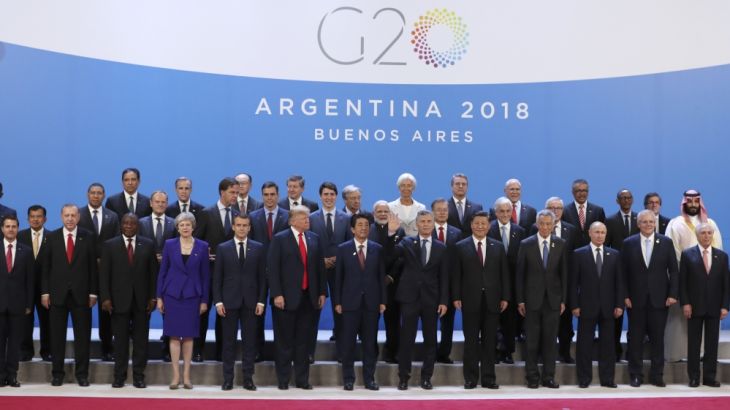Trump diverges from G20 partners on climate change, protectionism
Final communique reiterates US decision to withdraw from Paris deal and omits G20 pledges to fight protectionism.

The leaders of G20 have found the minimum common ground to fix the global economy after the difficult, all-night talks in Argentina, but only 19 of them agreed to support the Paris agreement on climate.
United States President Donald Trump diverged from his G20 partners at the summit in the capital, Buenos Aires, as he refused to back the global action on climate change and by watering down past pledges to fight trade protectionism.
Keep reading
list of 4 itemsWhy are nations racing to buy weapons?
Parallel economy: How Russia is defying the West’s boycott
US House approves aid package worth billions for Ukraine, Israel
A final communique, adopted on Saturday, said all the other G20 members agreed to implement the “irreversible” Paris Agreement while respecting different paces of economic development.
However, it said the US “reiterates its decision to withdraw from the Paris Agreement”, mirroring the divergence seen last year when Trump shocked the global community by bucking the consensus at his first G20.
The statement also omitted pledges by the G20 to fight protectionism and uphold multilateral trading rules, which used to be a mainstay of the world’s leading economies in a pre-Trump era.
Instead, the group merely recognised the “contribution” of the “multilateral trading system” and added that it was “falling short” in its goals of growth and job creation.
Bush’s death causes rare show of unity
Trump’s determination to plough on with his “America First” agenda stands in contrast to the alliance-building presidency of George HW Bush, whose death on Friday triggered a rare show of unity among the G20 leaders.
The US president said his predecessor’s passing would prevent him from holding a post-summit news conference scheduled later on Saturday “out of respect” for the Bush family.
It was Trump’s second cancellation during the summit after he snubbed President Vladimir Putin in Buenos Aires, citing Russia‘s recent naval skirmish with Ukraine. Trump also downgraded his meetings with other G20 leaders to make them less formal.
It means, Trump will no longer face press questions over new developments this week stemming from a US investigation into whether his presidential campaign colluded with Russia, which has now spread to cover his past business dealings.
The Russia-Ukraine escalation and killing of journalist Jamal Khashoggi by Saudi officers in Istanbul were among the issues flared up at the two-day summit, which was also attended by Saudi Arabia’s Crown Prince Mohammed bin Salman.
Trump’s isolationist rampage is the polar opposite of the West’s post-war consensus on trade and diplomacy built by Bush and his predecessors in the White House.
IMF warns of economic upheaval
The G20 leaders, whose nations represent four-fifths of the global economy, heard warnings from the International Monetary Fund (IMF) of a worldwide upheaval if Trump continues on his tariff-strewn path.
IMF chief Christine Lagarde warned the leaders that “the global economy faces a critical juncture” and that erecting trade barriers was “self-defeating”.
The threat of Britain crashing out of the European Union without a negotiated deal is another potential headwind, the IMF said, as Prime Minister Theresa May used the summit to sell her vision of a “global Britain” after Brexit.
For financial markets, the weekend’s main course comes after the summit when Trump is due to have dinner with Chinese President Xi Jinping in Buenos Aires.
Trump, who has already slapped $250bn in tariffs on China and threatened more next month, sounded upbeat about making progress with Xi.
“We’re working very hard. If we could make a deal, that would be good,” he said on Friday.
Trump has thrown out the traditional US playbook on free trade since his shock 2016 election, vowing to protect forgotten workers and demanding a renegotiation of the North American Free Trade Agreement with Canada and Mexico.